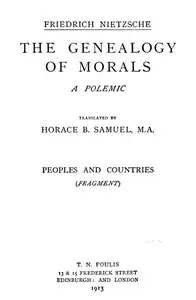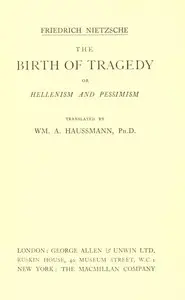"The Genealogy of Morals" by Friedrich Wilhelm Nietzsche is a philosophical polemic written in the late 19th century. This work examines the origins and evolution of moral values, particularly the concepts of "good" and "evil," and presents a critique of traditional moral values shaped by ascetic ideals and resentment. Nietzsche seeks to uncover the historical contexts in which these moral prejudices developed, exploring their implications for human behavior and the concept of morality itself. The opening of "The Genealogy of Morals" introduces Nietzsche’s examination of self-knowledge and the historical roots of our moral judgments. He reflects on humanity's struggle to understand the origins of concepts like "Good" and "Evil," suggesting that philosophical inquiries into morality often fail due to a lack of historical and psychological insight. Nietzche conveys his intention to dissect moral values, contrasting aristocratic values, which he associates with nobility and strength, against the slave morality that arises from ressentiment, or resentment from the weak. This exploration leads to a deeper understanding of the motivations behind moral judgments and the complexities of human psyche shaped by culture and history. (This is an automatically generated summary.)

The Genealogy of Morals The Complete Works, Volume Thirteen, edited by Dr. Oscar Levy.
By Friedrich Wilhelm Nietzsche
Also contains: Peoples and Countries (fragment).
Friedrich Wilhelm Nietzsche was a German classical scholar, philosopher, and critic of culture, who became one of the most influential of all modern thinkers. He began his career as a classical philologist before turning to philosophy. He became the youngest person to hold the Chair of Classical Philology at the University of Basel in Switzerland in 1869, at the age of 24, but resigned in 1879 due to health problems that plagued him most of his life; he completed much of his core writing in the following decade. In 1889, at age 44, he suffered a collapse and afterward a complete loss of his mental faculties, with paralysis and probably vascular dementia. He lived his remaining years in the care of his mother until her death in 1897, and then with his sister Elisabeth Förster-Nietzsche. Nietzsche died in 1900, after experiencing pneumonia and multiple strokes.


















